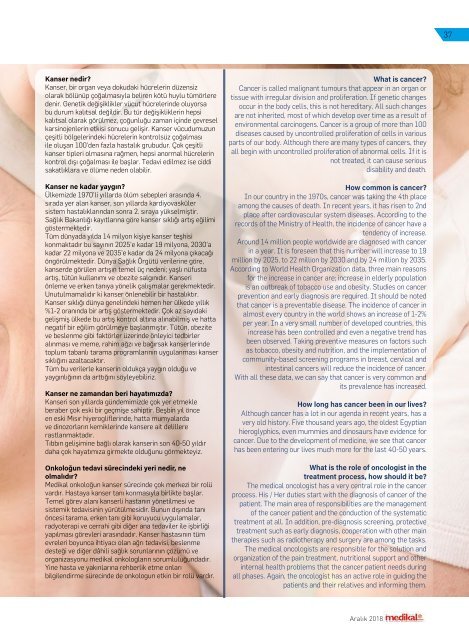Medikal_Aralık_2018
Create successful ePaper yourself
Turn your PDF publications into a flip-book with our unique Google optimized e-Paper software.
37<br />
Kanser nedir?<br />
Kanser, bir organ veya dokudaki hücrelerin düzensiz<br />
olarak bölünüp çoğalmasıyla beliren kötü huylu tümörlere<br />
denir. Genetik değişiklikler vücut hücrelerinde oluyorsa<br />
bu durum kalıtsal değildir. Bu tür değişikliklerin hepsi<br />
kalıtsal olarak görülmez, çoğunluğu zaman içinde çevresel<br />
karsinojenlerin etkisi sonucu gelişir. Kanser vücudumuzun<br />
çeşitli bölgelerindeki hücrelerin kontrolsüz çoğalması<br />
ile oluşan 100’den fazla hastalık grubudur. Çok çeşitli<br />
kanser tipleri olmasına rağmen, hepsi anormal hücrelerin<br />
kontrol dışı çoğalması ile başlar. Tedavi edilmez ise ciddi<br />
sakatlıklara ve ölüme neden olabilir.<br />
Kanser ne kadar yaygın?<br />
Ülkemizde 1970’li yıllarda ölüm sebepleri arasında 4.<br />
sırada yer alan kanser, son yıllarda kardiyovasküler<br />
sistem hastalıklarından sonra 2. sıraya yükselmiştir.<br />
Sağlık Bakanlığı kayıtlarına göre kanser sıklığı artış eğilimi<br />
göstermektedir.<br />
Tüm dünyada yılda 14 milyon kişiye kanser teşhisi<br />
konmaktadır bu sayının 2025’e kadar 19 milyona, 2030’a<br />
kadar 22 milyona ve 2035’e kadar da 24 milyona çıkacağı<br />
öngörülmektedir. Dünya Sağlık Örgütü verilerine göre,<br />
kanserde görülen artışın temel üç nedeni; yaşlı nüfusta<br />
artış, tütün kullanımı ve obezite salgınıdır. Kanseri<br />
önleme ve erken tanıya yönelik çalışmalar gerekmektedir.<br />
Unutulmamalıdır ki kanser önlenebilir bir hastalıktır.<br />
Kanser sıklığı dünya genelindeki hemen her ülkede yıllık<br />
%1-2 oranında bir artış göstermektedir. Çok az sayıdaki<br />
gelişmiş ülkede bu artış kontrol altına alınabilmiş ve hatta<br />
negatif bir eğilim görülmeye başlanmıştır. Tütün, obezite<br />
ve beslenme gibi faktörler üzerinde önleyici tedbirler<br />
alınması ve meme, rahim ağzı ve bağırsak kanserlerinde<br />
toplum tabanlı tarama programlarının uygulanması kanser<br />
sıklığını azaltacaktır.<br />
Tüm bu verilerle kanserin oldukça yaygın olduğu ve<br />
yaygınlığının da arttığını söyleyebiliriz.<br />
Kanser ne zamandan beri hayatımızda?<br />
Kanseri son yıllarda gündemimizde çok yer etmekle<br />
beraber çok eski bir geçmişe sahiptir. Beşbin yıl önce<br />
en eski Mısır hiyerogliflerinde, hatta mumyalarda<br />
ve dinozorların kemiklerinde kansere ait delillere<br />
rastlanmaktadır.<br />
Tıbbın gelişimine bağlı olarak kanserin son 40-50 yıldır<br />
daha çok hayatımıza girmekte olduğunu görmekteyiz.<br />
Onkoloğun tedavi sürecindeki yeri nedir, ne<br />
olmalıdır?<br />
<strong>Medikal</strong> onkoloğun kanser sürecinde çok merkezi bir rolü<br />
vardır. Hastaya kanser tanı konmasıyla birlikte başlar.<br />
Temel görev alanı kanserli hastanın yönetilmesi ve<br />
sistemik tedavisinin yürütülmesidir. Bunun dışında tanı<br />
öncesi tarama, erken tanı gibi koruyucu uygulamalar,<br />
radyoterapi ve cerrahi gibi diğer ana tedaviler ile işbirliği<br />
yapılması görevleri arasındadır. Kanser hastasının tüm<br />
evreleri boyunca ihtiyacı olan ağrı tedavisi, beslenme<br />
desteği ve diğer dâhili sağlık sorunlarının çözümü ve<br />
organizasyonu medikal onkologların sorumluluğundadır.<br />
Yine hasta ve yakınlarına rehberlik etme onları<br />
bilgilendirme sürecinde de onkologun etkin bir rolü vardır.<br />
What is cancer?<br />
Cancer is called malignant tumours that appear in an organ or<br />
tissue with irregular division and proliferation. If genetic changes<br />
occur in the body cells, this is not hereditary. All such changes<br />
are not inherited, most of which develop over time as a result of<br />
environmental carcinogens. Cancer is a group of more than 100<br />
diseases caused by uncontrolled proliferation of cells in various<br />
parts of our body. Although there are many types of cancers, they<br />
all begin with uncontrolled proliferation of abnormal cells. If it is<br />
not treated, it can cause serious<br />
disability and death.<br />
How common is cancer?<br />
In our country in the 1970s, cancer was taking the 4th place<br />
among the causes of death. In recent years, it has risen to 2nd<br />
place after cardiovascular system diseases. According to the<br />
records of the Ministry of Health, the incidence of cancer have a<br />
tendency of increase.<br />
Around 14 million people worldwide are diagnosed with cancer<br />
in a year. It is foreseen that this number will increase to 19<br />
million by 2025, to 22 million by 2030 and by 24 million by 2035.<br />
According to World Health Organization data, three main reasons<br />
for the increase in cancer are; increase in elderly population<br />
is an outbreak of tobacco use and obesity. Studies on cancer<br />
prevention and early diagnosis are required. It should be noted<br />
that cancer is a preventable disease. The incidence of cancer in<br />
almost every country in the world shows an increase of 1-2%<br />
per year. In a very small number of developed countries, this<br />
increase has been controlled and even a negative trend has<br />
been observed. Taking preventive measures on factors such<br />
as tobacco, obesity and nutrition, and the implementation of<br />
community-based screening programs in breast, cervical and<br />
intestinal cancers will reduce the incidence of cancer.<br />
With all these data, we can say that cancer is very common and<br />
its prevalence has increased.<br />
How long has cancer been in our lives?<br />
Although cancer has a lot in our agenda in recent years, has a<br />
very old history. Five thousand years ago, the oldest Egyptian<br />
hieroglyphics, even mummies and dinosaurs have evidence for<br />
cancer. Due to the development of medicine, we see that cancer<br />
has been entering our lives much more for the last 40-50 years.<br />
What is the role of oncologist in the<br />
treatment process, how should it be?<br />
The medical oncologist has a very central role in the cancer<br />
process. His / Her duties start with the diagnosis of cancer of the<br />
patient. The main area of responsibilities are the management<br />
of the cancer patient and the conduction of the systematic<br />
treatment at all. In addition, pre-diagnosis screening, protective<br />
treatment such as early diagnosis, cooperation with other main<br />
therapies such as radiotherapy and surgery are among the tasks.<br />
The medical oncologists are responsible for the solution and<br />
organization of the pain treatment, nutritional support and other<br />
internal health problems that the cancer patient needs during<br />
all phases. Again, the oncologist has an active role in guiding the<br />
patients and their relatives and informing them.<br />
<strong>Aralık</strong> <strong>2018</strong>

















